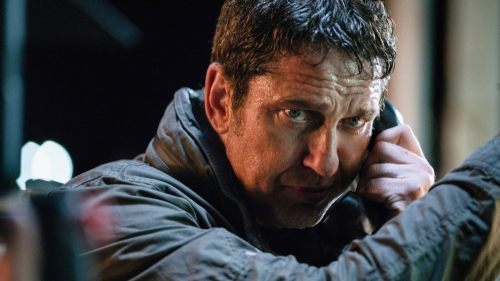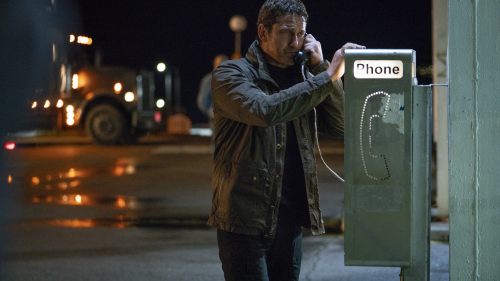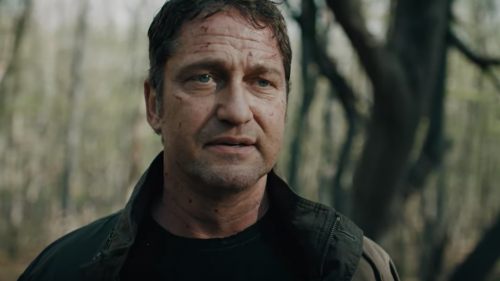Say Something Nice: TIMELINE
(With apologies for the clip’s aspect ratio.)
Ah, Gerard Butler. Truly, the Scottish actor is a modern master of cinematic rage. From his breakout as King Leonidas in 300 to bloody donut-chomping Big Nick O’Brien in this year’s delightfully scuzzy Den of Thieves, nobody does anger quite like Butler. He’s a better actor than his reputation as one of the reigning kings of January schlock may sometimes suggest. See the aforementioned Den of Thieves, where Nick O’Brien is a loud, angry, shouty, gleefully corrupt sheriff who’s also desperately lonely and scratching at the realization that his rambunctious machismo has become a self-perpetuating trap. Or for something more family friendly, there’s his excellent, layered vocal turn as the conflicted, well-meaning and initially heavy-handed Viking chieftain Stoick the Vast in the How to Train Your Dragon films. There’s more to Butler than yelling angrily and stabbing things, even if he is particularly good at that. For one particularly striking example of Butler’s range, I’d like to turn to his performance as André Marek in Richard Donner’s 2003 Michael Crichton adaptation Timeline.
Timeline is a dreadful movie. It’s a hybrid of science fiction and medieval war film that was made for $80 million, but it looks cheap and it feels small. The cast, barring Butler and an enjoyably all-caps EVIL Michael Sheen, look and sound like they’re totally lost at sea. The late Paul Walker in particular suffers as a graduate student trying to rescue his dad (Billy Connolly). The low-key charm he displayed in his later Fast and Furious movies is absent here, leaving naught but, to borrow a phrase from Scott Tobias, a perpetually-confused sounding, early-2000s-haired “handsome blandling.” The script has a few scattered moments of potency – if I wasn’t writing about Butler, I’d write about the genuinely tense scene where Sheen’s fiendish English knight forces the time travelers’ French linguist (Rossif Sutherland) to translate the French for “I am a spy” and promptly executes him – but more often than not it’s vague, flailing, clumsy exposition. Comparing the mechanics of the picture’s time travel to the process of sending a fax could have worked with better wording. In practice, it results in a fantastic science fiction conceit (time travel) sounding oddly mundane. This is all the more egregious given that the unsettling aspects of the time machine (the person who goes back to the past isn’t quite the same person who arrives in the past) are explored (Marton Csokas’ De Kere, one of Sheen’s allies, turns out to be a stranded time traveler driven insane by the damage the machine inflicted on his mind), they’re just paired with the frustratingly awkward notion of a time machine as the biggest, most powerful fax machine in human history. The result of this muddle? A dull, tasteless movie that makes the good parts of fellow crummy sword and chainmail pics King Arthur: Legend of the Sword and Transformers: The Last Knight shine all the brighter.
But then there’s Butler. His André Marek is a man out of time, an archeologist who is not merely fascinated by medieval history, but who romanticizes and on some level longs to live it. Prior to Professor Johnston (Connolly)’s disappearance, Marek and Johnston’s students had been intrigued by the sarcophagus of an unidentified knight with a prominently maimed ear. When Johnston vanished and then it turned out that time travel was in play, the mysterious knight naturally fell by the wayside. It’s only in Timeline’s climax that the dead knight comes back into play.
Over the course of his trip to the past, Marek meets and rapidly falls for the French noblewoman Lady Claire (Anna Friel). And where the rest of the team mostly wants to rescue Johnston, avoid getting stabbed and go home, Marek wants to rescue Johnston and avoid getting stabbed. The more he sees of the past, the more it feels right. During Timeline’s final battle, he and De Kere clash. De Kere gets the upper hand initially and maims Marek’s ear. Marek’s initially terrified and in pain, as anyone would be after getting most of their ear chopped off. But then he realizes something. The wound De Kere just gave him is the exact same wound the knight on the sarcophagus had. He is the knight. Propelled by a heady mix of surprise, joy and mania, Marek rallies and strikes down De Kere. He and Claire embrace, only to be interrupted by Chris. The window for the team to get back to the future is rapidly closing, and if they’re going to make it, they have to leave immediately. But there’s nowhere for Marek to go. He retrieves the time travel trinket De Kere had swiped from him, tosses it to Chris and asks him to give the others his goodbyes. As Chris runs to make the trip home, Marek and Claire embrace.
To be certain, there’s a bit of novelty in a scene where Gerard Butler is yelling because he’s happy rather than enraged. But beyond that, Butler does very fine, even complex work with Marek’s moment of realization. And some of Timeline’s flaws become assets. The oddly small scale becomes intimate. The clumsy fight choreography becomes a desperate clash in the midst of chaos. Realizing that he is the knight in the sarcophagus is the culmination and end of André Marek’s life in 2003. Simultaneously, it’s the beginning of his life in 1573. It’s death and rebirth in the dying embers of a calamitous battle. It’s Marek’s joy at finding the place he belongs overcoming De Kere’s nihilistic fury (with no way home, the increasingly insane William Decker became the murderous William De Kere, living embodiment of the cruelest parts of the 1500s). It’s a moment of narrative clarity in a film that doesn’t have much otherwise, built on a striking piece of performance from an often-pigeonholed, sometimes underappreciated actor.



